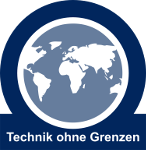Agroforestry workshops in Ghana and Uganda
About the Project
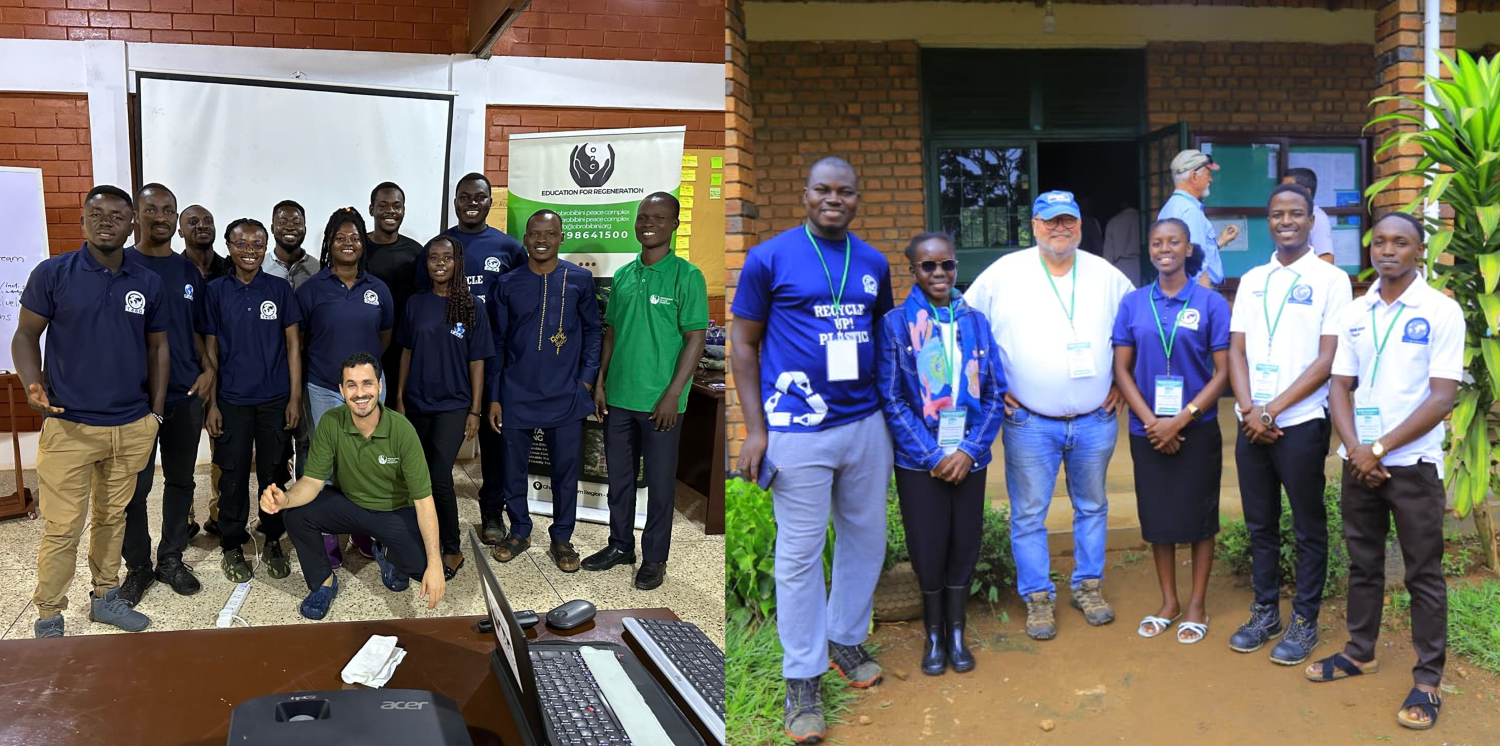 In August 2025, nine members of TwB Ghana and four members of TwB Uganda participated in agroforestry trainings with the aim to strengthen our organization’s capacity in Dynamic Agroforestry – an innovative and sustainable approach to integrating agriculture and forestry that emphasizes diversity, synergy, and resilience
As the international working group leader for agroforestry, I had the privilege to participate in two Agroforestry Training of Trainers Program, one in Ghana and one in Uganda, alongside with other local members.
The first agroforestry training took place on 9th August as a one-day training session at the Obrobibi Peace Complex (OPC) in Busua, Ghana and was held by Dr. Christian Andres. The nine participants of TwB Ghana arrived on 8th August 2025 to ensure punctuality and adequate preparation. The program began with an introduction to OPC’s vision and activities, followed by participant introductions. Dr. Christian Andres, with whom TeoG has been in a friendly working relationship for several years, outlined the training objectives and expectations, encouraging participants to embrace an enjoyable and engaging approach to learning, emphasizing that “when it’s fun, it’s sustainable.” He also emphasized the importance of diversification and continuous experimentation with new plant and tree species. The second session explored key elements of dynamic agroforestry, including land preparation, plant management for ensuring proper plant combinations, maintaining plant health, and maximizing space use, and strategic practices, e.g. banana irrigation techniques. The next chapter dealt with Agroforestry model designs followed by a practical session in which the participants engaged in hands-on practice at OPC’s demonstration farm, applying spacing and companion planting techniques. The field session highlighted how integrated systems of trees and crops can yield mutual benefits, while also exposing participants to the labour-intensive nature of agroforestry. The training was rounded up by guided tours of OPC’s innovative enterprises, such as a mushroom Production Unit and a palm Oil and Soap Production Unit.
The second agroforestry training was held at Bethany Land Institute (BLI), Uganda, from the 17th to 23rd of August 2025 by the Rotarian Roland Frutig and his team. Roland Frutig and TeoG have also been continuously exchanging ideas for many years. At the request of the TeoG board, I, as a Ghanaian, also took part in this agroforestry workshop in Uganda, as I will be taking over the international leadership of the agroforestry working group.I was accompanied by four members of TwB Uganda. The program brought more than 30 participants from over 8 countries and various organizations together, providing a rich multicultural and multidisciplinary learning environment.
The training started with an Introduction to Agroforestry (basics and principles), campus tour, and film screening “Life in Syntropy.” Further agenda points in the following days included field visits to demonstration farms, preparation of organic fertilizers, practical planting sessions, farm design sketching and visit of champion farmers, among others. The participants received seeds to start experimental plots, encouraging immediate application of acquired skills.
The training was structured around a 70% practical and 30% theoretical model, which allowed participants not only to understand agroforestry concepts but also to design, practice, and implement them directly in the field. The approach went beyond conventional academic learning, offering deeper insights than many advanced forestry courses. The balance between theory and practical experimentation made the knowledge gained both comprehensive and actionable.
The BLI Agroforestry Training of Trainers has equipped me with advanced skills and confidence to extend training to TwB members, farmers, students, and community groups back in Ghana. With adequate support and collaboration, these models can be adapted and scaled to enhance agroforestry adoption, strengthen climate resilience, and improve livelihoods.
To sum up, both Agroforestry trainings were highly impactful, equipping participants with both practical and theoretical knowledge. The TwB members in Ghana and Uganda who joined the trainings are committed to applying these lessons to enhance sustainable agriculture, build resilience, and promote environmental conservation across its operational communities. The agroforestry training will also The agroforestry training courses are also an excellent foundation for implementing microbusiness ideas of our local TwB members, some of which we intend to support. TwB should also explore collaborative partnerships with OPC and BLI for ongoing technical support and field exchanges.
Finally, we would like to express our sincere thanks to Dr. Christian Andres and Roland Frutig, as well as their teams on site, for giving our TwB members the opportunity to participate in these exciting and highly informative training sessions. (Abdul Rashid Wumpini Alhassan, RG Tamale, Ghana)
In August 2025, nine members of TwB Ghana and four members of TwB Uganda participated in agroforestry trainings with the aim to strengthen our organization’s capacity in Dynamic Agroforestry – an innovative and sustainable approach to integrating agriculture and forestry that emphasizes diversity, synergy, and resilience
As the international working group leader for agroforestry, I had the privilege to participate in two Agroforestry Training of Trainers Program, one in Ghana and one in Uganda, alongside with other local members.
The first agroforestry training took place on 9th August as a one-day training session at the Obrobibi Peace Complex (OPC) in Busua, Ghana and was held by Dr. Christian Andres. The nine participants of TwB Ghana arrived on 8th August 2025 to ensure punctuality and adequate preparation. The program began with an introduction to OPC’s vision and activities, followed by participant introductions. Dr. Christian Andres, with whom TeoG has been in a friendly working relationship for several years, outlined the training objectives and expectations, encouraging participants to embrace an enjoyable and engaging approach to learning, emphasizing that “when it’s fun, it’s sustainable.” He also emphasized the importance of diversification and continuous experimentation with new plant and tree species. The second session explored key elements of dynamic agroforestry, including land preparation, plant management for ensuring proper plant combinations, maintaining plant health, and maximizing space use, and strategic practices, e.g. banana irrigation techniques. The next chapter dealt with Agroforestry model designs followed by a practical session in which the participants engaged in hands-on practice at OPC’s demonstration farm, applying spacing and companion planting techniques. The field session highlighted how integrated systems of trees and crops can yield mutual benefits, while also exposing participants to the labour-intensive nature of agroforestry. The training was rounded up by guided tours of OPC’s innovative enterprises, such as a mushroom Production Unit and a palm Oil and Soap Production Unit.
The second agroforestry training was held at Bethany Land Institute (BLI), Uganda, from the 17th to 23rd of August 2025 by the Rotarian Roland Frutig and his team. Roland Frutig and TeoG have also been continuously exchanging ideas for many years. At the request of the TeoG board, I, as a Ghanaian, also took part in this agroforestry workshop in Uganda, as I will be taking over the international leadership of the agroforestry working group.I was accompanied by four members of TwB Uganda. The program brought more than 30 participants from over 8 countries and various organizations together, providing a rich multicultural and multidisciplinary learning environment.
The training started with an Introduction to Agroforestry (basics and principles), campus tour, and film screening “Life in Syntropy.” Further agenda points in the following days included field visits to demonstration farms, preparation of organic fertilizers, practical planting sessions, farm design sketching and visit of champion farmers, among others. The participants received seeds to start experimental plots, encouraging immediate application of acquired skills.
The training was structured around a 70% practical and 30% theoretical model, which allowed participants not only to understand agroforestry concepts but also to design, practice, and implement them directly in the field. The approach went beyond conventional academic learning, offering deeper insights than many advanced forestry courses. The balance between theory and practical experimentation made the knowledge gained both comprehensive and actionable.
The BLI Agroforestry Training of Trainers has equipped me with advanced skills and confidence to extend training to TwB members, farmers, students, and community groups back in Ghana. With adequate support and collaboration, these models can be adapted and scaled to enhance agroforestry adoption, strengthen climate resilience, and improve livelihoods.
To sum up, both Agroforestry trainings were highly impactful, equipping participants with both practical and theoretical knowledge. The TwB members in Ghana and Uganda who joined the trainings are committed to applying these lessons to enhance sustainable agriculture, build resilience, and promote environmental conservation across its operational communities. The agroforestry training will also The agroforestry training courses are also an excellent foundation for implementing microbusiness ideas of our local TwB members, some of which we intend to support. TwB should also explore collaborative partnerships with OPC and BLI for ongoing technical support and field exchanges.
Finally, we would like to express our sincere thanks to Dr. Christian Andres and Roland Frutig, as well as their teams on site, for giving our TwB members the opportunity to participate in these exciting and highly informative training sessions. (Abdul Rashid Wumpini Alhassan, RG Tamale, Ghana)
Gallerie
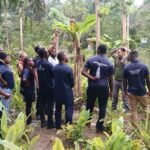
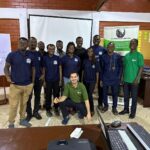
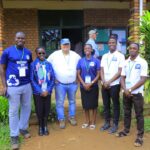
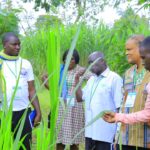
Information
Project number
Project Leader
jannik.mechau
Regional Groups
- Accra
- Sunyani
- Tamale
Project members
Abdul Rashid Wumpini Alhassan (RG Tamale, Ghana)
Project Category
 Agroforestry
Agroforestry Timespan
August 2025 - August 2025
Project stage
finished
News
No entries.
